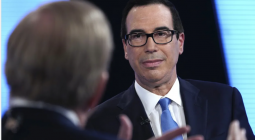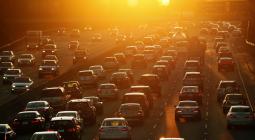States Sue to Block Trump From Weakening Fuel Economy Rules.

At stake in the lawsuit is the single biggest effort by the United States to fight the climate crisis.
Led by California, nearly two dozen states sued the Trump administration on Wednesday over its reversal of fuel-efficiency standards for cars and trucks, arguing that the move is based on erroneous science, and endangers public health.
The lawsuit escalates a standoff between President Trump, who has moved to undo a long list of environmental regulations since taking office, and a coalition of Democratic states, which have gone to court to stop him.
President Trump’s attempt to weaken future fuel economy standards — undoing what would have been the single biggest effort by the United States to fight the climate crisis — has been especially contentious and messy. Mr. Trump has called the rollback the crowning deregulatory achievement of his tenure, a move that he has said will save lives, lift the economy and help the auto industry.
Yet the auto industry itself has been split over the measure, which would weaken a 2012 standard that would have required automakers to improve the average fuel economy of cars and trucks to about 54 miles per gallon by 2025. The new standards set forth by the Trump administration only require automakers to improve their average fleetwide fuel economy to 40 miles per gallon.
The Alliance for Automotive Innovation, which represents major automakers including General Motors and Toyota, is defending the rollback. But four of their peers — Ford, Honda, BMW and Volkswagen — have split from the pack, declaring that they will continue to follow the lead of California and 13 other states that are upholding tougher standards than those set by the federal government. The battle is widely expected to reach the Supreme Court.
Xavier Becerra, California’s attorney general, said the Trump administration’s revised auto emissions rule ignored warnings from its own Environmental Protection Agency experts about serious flaws, including that the revised standards are likely to result in higher levels of air pollution. He called that a particular danger during the coronavirus pandemic.
“Vehicles are the biggest contributor to greenhouse gas emissions in America, and pollution-related respiratory illnesses make people more susceptible to Covid-19,” Mr. Becerra said.
According to Mr. Becerra, the lawsuit is the 82nd filed by California against the Trump administration, the majority of which have targeted reversals of climate and environmental regulations.
Dana Nessel, the attorney general of Michigan, said the new rule would lead to a decrease in auto industry jobs, which she said would be especially harmful to her state. She also called the rule “a slap in the face to public health.”
Ford Motor said in a statement that the company was not part of either the litigation or the effort by the Alliance of Automotive Innovation to defend the Trump administration’s rule. “We have chosen a different path,” said a spokeswoman, Rachel McCleery.
Wade Newton, a spokesman for the alliance, said the industry group had not yet seen the lawsuit but would review it.
By the Trump administration’s own calculations, changing the rule increases the emissions of greenhouse gases, the primary cause of global warming, by at least 867 million metric tons relative to the standards being rolled back. That is greater than the amount many midsize countries put out in a year.
Environmental groups have also warned of the public health consequences of more tailpipe pollution, linked to asthma and other health problems. Consumer advocates, meanwhile, have refuted the Trump administration’s claims that the laxer standards will lead to cheaper cars, and warn that car owners will instead end up paying more for gas.
“The Trump administration’s rollback of the Clean Car Standards will hurt Americans, increase harmful pollution, cause more than 18,000 premature deaths, and cost consumers billions of dollars at the gas pump,” said Peter Zalzal, lead attorney at the Environmental Defense Fund. “The rollback is deeply and fundamentally flawed, it is inconsistent with the agencies’ legal duty to reduce harmful pollution and conserve fuel, and we look forward to vigorously challenging it in court.”
27 May 2020
The New York Times




